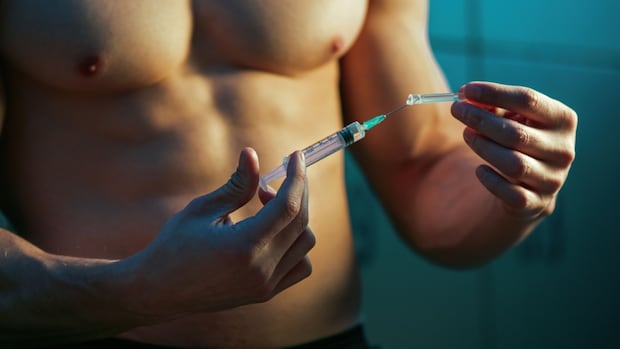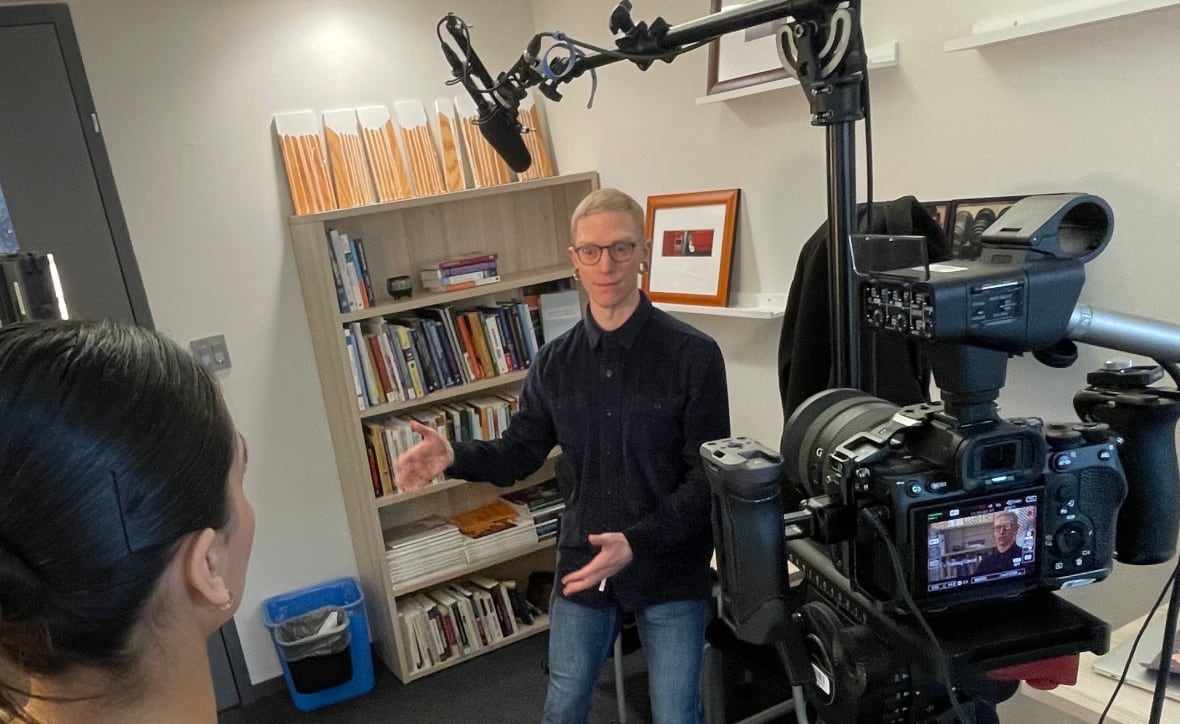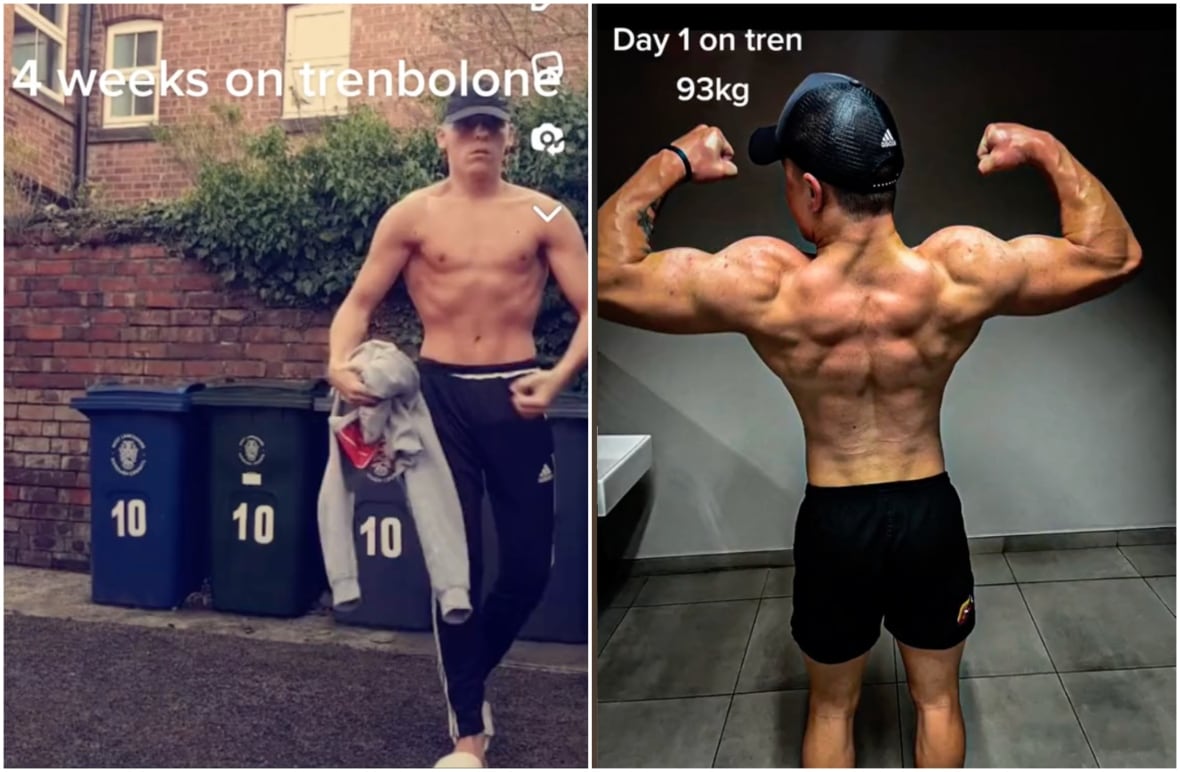
Experts and parents are sounding the alarm about non-medical anabolic steroid use as posts glorifying it grow on social media.
Experts suggest it’s related to a concerning rise in body dysmorphia among men.
“The pressures on young males around body ideals has increased,” said Kyle Ganson, a University of Toronto assistant professor in social work who studies muscle dysmorphia, a body image-related disorder that is common among men.
“They’re seeing people on social media like, ‘This is what the male body should look like,’ ” Ganson said. “Basically, you perceive yourself to be smaller or less muscular than you actually are.”
Muscle dysmorphia cases rising, studies suggest
As non-medical steroid sales happen on the black market and online, it is difficult to track usage. But several studies suggest muscle dysmorphia is on the rise, and seems to be inspiring steroid use.
A recent study in the U.K. found that nearly a quarter of men rarely or never feel body confident, and young men between the ages of 18 and 24 were the most likely to try steroids. In Australia, one study found social media use is fuelling rising anabolic steroid usage among men and adolescent boys, while a government drug use survey found non-medical anabolic steroid use has tripled.

Today, an ideal male body type is often considered lean, muscular and toned with a V-shaped torso, says Ganson.
That means men aren’t necessarily striving to bulk up like Sylvester Stallone or Arnold Schwarzenegger. Instead, they might use anabolic steroids, such as Anavar, Testosterone, or Trenbolone, to achieve a cut or toned look faster.
And there are risks. While many people use steroids without suffering side effects, there are several associated with anabolic steroids, including keloid scarring, premature baldness, mood swings, severe depression, organ failure — even heart attacks or strokes.
“They can really affect almost every system of the body, cardiovascular or neurological, endocrine,” said Ganson.

Easy access to controlled drug
Anabolic steroids are a controlled drug in Canada and illegal without a prescription. And yet, they are shockingly easy to access. CBC News found nearly a dozen websites that sell steroids directly to consumers seemingly without requiring a prescription — and they ship across the country.
Andy has been using anabolic steroids himself for nearly 10 years. CBC News has agreed not to use his real name because he is worried about job prospects.
“When I was 21, I just wanted to be as big as possible,” said Andy, now 30.
He buys his steroids online.
“Right now, my testosterone is cheaper than the protein powder I buy,” he said, adding it costs him about $80 to $100 for a vial that can last anywhere from four to 20 weeks.
Andy says he’s never experienced major side effects, and that steroid use has been largely positive for him. Still, he admits that coming off anabolic steroids isn’t easy. Rather than stopping completely, he instead chooses to cycle between higher and then lower doses.
“When I used to get off them completely, it’s about four to six weeks of just hell, because you go from, you know, 10 to 12 times your regular amount of testosterone to nothing in your body.”
He says mood swings are part of that change.
‘We are a worst-case scenario’
Rob Saloman and Laurel Lowry are coping with what they call the “worst-case scenario” of steroid use.
They say their son, Nick Saloman, struggled with his body image and self esteem, and ultimately started using anabolic steroids.
“Nicholas was probably 5-7,” said his mother. “The pretty girls would always want the taller guys and he felt that that was a terrible disadvantage with women or with girls.”
“He wanted to be bigger and steroids were a way to be physically bigger,” his father said.

Rob and Laurel believe that anabolic steroids contributed to Nick’s deteriorating mental health, especially when he tried getting off them.
Nick died by suicide at age 33 last year.
“We just feel the steroids took away his ability to cope as most people would cope with life stresses,” Saloman said of his son. “The lows were low and the emotions of the moment were magnified. He had a lot of anxiety.”
Ultimately, Nick, known for his generosity and sense of humour, wanted to get off steroids because he was thinking about fertility and having children. But that proved difficult.
“There’s just no question in my mind when he stopped buying them — which we can see in his records — he was having more struggles and more lows,” Saloman said.
Now, his parents want his story to raise awareness about the risks associated with anabolic steroid misuse — and about body dysmorphia in men.
“We are a worst-case scenario,” Lowry said. “But I guess our warning would be that it can go down this route and they can have catastrophic impacts.”
Withdrawal can lead to depression, doctor says
U.K.-based psychiatrist and addiction specialist Dr. William Shanahan says more young men are turning to steroids, and he sees cases of steroid withdrawal that can lead to outcomes like Nick’s.
“The abrupt cessation of drug use can lead to major symptoms of depression and sometimes even the onset of suicidal thinking,” Shanahan told CBC News.
“And then the use itself can lead to problems with irritation, anger management problems and depression, and even psychosis.”
Shanahan says that many people will use steroids without any problems, but notes that the risks are real and he suspects we’re seeing just the tip of the iceberg in terms of steroid use and the trouble it can cause.
“The drug they’re taking can be every bit as destructive as the street drugs like cocaine, and can cause major problems in their physical and mental health,” he said.
Open conversations key to intervention
Kaivan Shimi is a personal trainer in Toronto who says his teenage clients have asked about steroids. Often, he says it’s because they see fit influencers on social media.
“They idolize them, right? So they want to be like them,” said Shimi, who doesn’t use steroids himself and encourages his clients to stay natural.
“These influencers are pretty open about what they’re taking.”
Sites like Instagram and TikTok are teeming with videos and posts encouraging men to get big. Many even promote steroids — despite the dire risks associated with misuse.
TikTok fitness influencers have never been more popular, but new research warns that many of their videos are misleading and could be physically and mentally harmful.
Ganson says open conversations about body image with men and boys is key to helping avoid tragedies and overcoming the pressure they face to look a certain way.
“We haven’t really spent a lot of time in society and research focusing on male body image as much as we have for female body image,” he said.
“We can’t overlook males anymore.”




